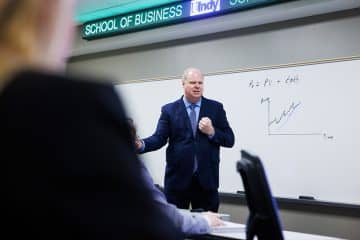How To Get a Letter of Recommendation for Your MBA Application
Getting into the right MBA program can be an intimidating and time-consuming process. From the GMAT to essays and interviews, you’ll be writing and meeting with admissions gatekeepers constantly. MBA programs are in high demand, so competition can be pretty fierce. That’s why you should take every part of the process seriously, including securing a stellar letter of recommendation.
A letter of recommendation is one of your best tools. In the minds of admissions officers, it transforms you from a list of statistics and grades into a real person with dynamic talents. If you’re not sure how or who to approach for a letter of recommendation, let this five-step guide get you started.
1. Find the Right Letter Writer(s)
The first step in getting a letter of recommendation for an MBA program is finding the right person to write it. While many programs will accept letters from professors, professional sources are almost always valued more. You are, after all, training as a business professional.
Your best bet at a letter of recommendation would be a supervisor or direct report at your current job. They can provide specific examples about your accomplishments and professional behavior. Chances are they would be more than happy to help you pursue this next step in your professional development.
If a supervisor is great, though, wouldn’t asking for a recommendation from a higher-ranking executive even better? Well, that’s not always the case. That executive may know you by sight and name, but they may not have ever worked directly with you. Their recommendation may be impersonal and unspecific—two things admissions officers notice. That being said, if you have a great working relationship with an executive, they could vouch for you as well.
While a supervisor is a good go-to, you could also ask any of the following for a contribution:
- Colleagues. Colleagues can speak on how you promote a healthy working environment. This colleague is ideally higher-ranking than yourself, even if they’re not a direct supervisor.
- Mentors. If you’ve developed a mentor relationship with someone in your potential field, they can speak to your ambition and willingness to adapt, achieve, and learn.
- Professors. While professional recommendations are always preferred, a professor can highlight your academic prowess and progress.
Never ask friends, family members, or peers for recommendations; they may sing your praises loudly, but they can’t speak concretely nor without bias about your work performance.
2. Approach Them Personally
With prospective letter writers in mind, it’s time to approach them. This should be done in-person or over the phone. Texting or emailing about their schedule is fine, but since they’re doing you a huge favor, make it more personal.
If their schedule allows, take them out for coffee or lunch. In this outside-of-work environment, you can bolster your relationship and explain why you’ve approached them. You can also impress upon them how much of a positive impact they’ve had on your professional career. While this can be done over email, it doesn’t carry the same weight as an in-person meeting.
3. Give Them Time
While you’re just starting your business career, the person writing your recommendation is probably well into theirs. Though you’re balancing MBA applications and work, they may have more work and life responsibilities. Give letter writers time to think it over and write a very specific, heartfelt recommendation.
Give your letter writer a deadline before the actual deadline requested by the school. If they forget or something unforeseen happens, this buffer will give you time to check in and remind them that you need their letter. Ideally, your writer should have about two weeks between their letter due date and your application due date.
Ample time also gives them a polite way to refuse if they don’t feel comfortable writing a recommendation. While it’s not likely personal, a person may decline writing a recommendation if they don’t have time or they feel like they don’t know you well enough. Take this as an opportunity to reassess who would make a good recommendation writer.
4. Give Them Resources
For some people you approach, writing letters of recommendation might be a routine experience. More senior executives probably do a few every year. They may even be familiar with what your particular MBA program is looking for.
Younger supervisors might not have that experience. Don’t let that dissuade you from seeking their help, though. They may have a clearer memory of what it’s like to apply to business school, so they could be enthusiastic to finally be on the other side of the table.
Direct that enthusiasm by giving them resources to make writing your letter as easy as possible. They may know exactly which of your qualities they’d like to highlight, but not how to put it in writing. To get them off to a good start, give them copies of:
- Your résumé and a list of relevant accomplishments
- An MBA letter of recommendation writing guide, preferably from the school of your choice (if available)
- An outline of your goals and aspirations
- Academic transcripts
- Submission instructions
This may seem like overkill if you’re well-acquainted with the letter writer, but every little bit helps. Remember: your future is partially in their hands. Be clear and transparent. The more they know and understand, the fewer obstacles they will have and the better their letter will be.
5. Thank Recommendation Writers
We’ve already said it once, but it can’t be reiterated enough: writing a letter of recommendation is a huge favor to you. If your experience, grades, and test scores are similar to other applicants’, a great letter might be the thing that seals your fate.
Send your writer a letter, flowers, a box of chocolates, or a bag of their favorite coffee. It doesn’t have to be grand, but make it personal. They put a lot of effort into your recommendation letter. By showing gratitude, you’re not just improving a business relationship; you’re doing right by someone who didn’t have to help you but did anyway.
Have More Questions About MBA Program Admissions?
Securing a letter of recommendation is only one step in the MBA program admissions process. To find advice on topics including business school recruitment, job prospects for MBA grads, and more, explore Abound: MBA’s library of resources. And if you’re still looking for a program to apply to, you can view our cohort of vetted, high-quality MBA programs.





